Catalina Island, the small resort town located an hour by ferry from Long Beach, might be the last place I expected to go for a survival course. Before last weekend, my only frame of reference to it was “the Catalina f—ing wine mixer” in the comedy Step Brothers. So I thought it sounded like the setup to a joke when I was invited out there to attend a weekend event with the Bear Grylls Survival Academy as a promotion for Arthur the King, a movie about Mark Wahlberg befriending a stray dog while racing through the jungle.
But it wasn’t a joke. It was a real event with real planning to highlight a film based on a true story. Arthur the King was inspired by Mikael Lindnord’s memoir Arthur: The Dog Who Crossed the Jungle to Find a Home. Lindnord really was an adventure athlete and really did befriend a dog he named Arthur during a race.
While the point of the event was to gain publicity for the movie, I found it hard to imagine how they’d conduct a survival course for a group of entertainment reporters and influencers at a place known for leisure. But this is what happened.
Arthur the King
Arthur the King is about fictitious adventure athlete Micheal Light (played by Wahlberg) who has an insatiable appetite for adventure and an unwavering drive to compete. His faults are immediately apparent in the opening sequence when he ignores advice from his teammates and leads them down uncharted waters as he tries to get ahead of the other teams. They get stuck in a low tide and are forced to quit the race.
The movie follows Light as he pursues his last chance to win a big adventure race. To do that, he solicits money from sponsors and cashes out his savings to pay for the trip and training. Then he builds a team by recruiting a newbie and an over-the-hill contender, and making amends with an estranged teammate. The hodgepodge collection of athletes set off for Light’s final race. About a quarter of the way into the movie, Light shares food with a dog. Two hundred miles or so later, he discovers that the dog has been following him and they become inseparable.
The connection between the film and Bear Grylls makes sense from the start. Grylls isn’t in the movie, but he is present as a commentator (or maybe narrator because the race doesn’t appear to be broadcast) for the race and provides exposition. He reveals things like how Light is the most skilled adventure racer who has never won a championship.
Journey to Catalina Island
From a distance, Catalina Island looked more like Jurassic Park than a swanky winery and resort town. Mountains covered in trees and thick green vegetation jutted up from the shore were shrouded in low-lying clouds that varied in thickness and color (it rained on and off the entire weekend).
As we sailed around the island, you could see an ancient-looking dome and houses and hotels built into the mountainside. The town was packed with gift shops, restaurants, and bars. The entire tourist area — at least, the part I saw — reminded me of a cross between Charleston, South Carolina, and Galway, Ireland. You could walk the entire area in about a half hour.
Around 6:30 p.m., I went with about 20 other media types to meet with the publicity team at an event space about six minutes away from the hotel. There, I met hosts of lifestyle and travel shows, entertainment reporters, video game and movie influencers, a couple who podcasted about Peloton bikes, and other niche media.
Although the publicists sent out an itinerary, showing that we’d be doing things like zip lining, scrambling, kayaking, and experiencing a “survival” scenario in which we’d have to scavenge for food, we were all unsure about how intense the events would actually be.
As we ate smoked chicken, brisket, and ribs for dinner, the conversation ranged from talking about ourselves to the Arthur movie to our backgrounds in the outdoors, which ran the gamut. Some had little to no experience, others had some, and one was a licensed pilot and SCUBA diver. We joked about outdoor mishaps and drinking our own bodily fluids — at least, I did — and laughed awkwardly.
After an hour or so of dinner and drinks, instructors from the Bear Grylls Survival Academy introduced themselves by first name only. There were three Brits — Fraser, John, and Mark — and Sean, who introduced himself as a rope specialist and the only South African in the group.
During their presentation, they explained that adventure racing overlaps with outdoor survival in that you have to rely on your wits, your skills, and most importantly, your team. With that said, they explained that the course was designed to mirror what happened in the film, so not only would we be experiencing survival scenarios but also carry a dog, a bike, and a flag. What’s more, we’d have to exercise “situational awareness” by looking out for flags and then take group selfies by the flag for points.
Sass!
The next morning, the ground outside the hotel was wet from an overnight rain. A half-moon hung in the sky and ravens cawed from the trees above. We shuttled over in an electric van back to the venue where we ate the night before for breakfast – they served quiche, a variety of breakfast meats, and an assortment of pastries. With our bellies full, we departed for a full day of activities.
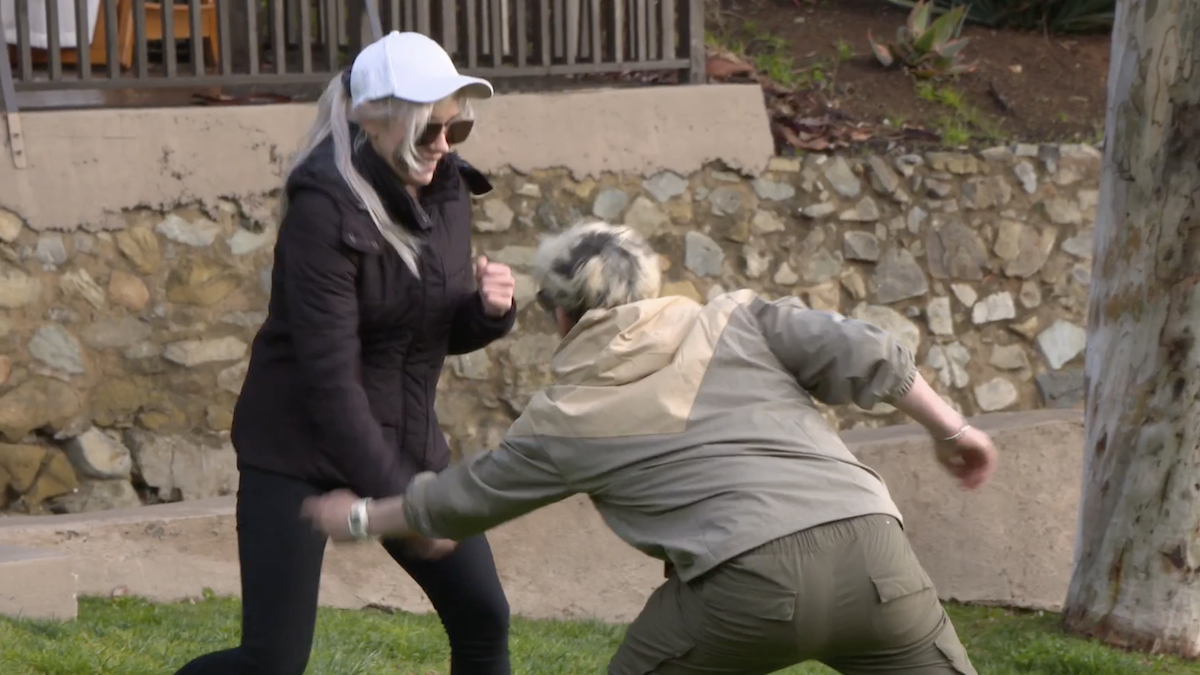
After stretching and smearing mud on our faces, the instructors expanded the concept of situational awareness. John, who told us the day would be “mega,” taught us “sass!” which no one seemed to know if it was slang or an acronym. But it was used as a kind of war cry. You yelled “sass!” when you encountered a low-hanging branch. “Sass!” when you saw a rock you could trip on. And “sass!” when encountering any obstacle or danger.
Since I was on Team 2, we practiced our sass skills while the other team went zip lining. I paired up with fellow Chicagoan Joey, who was a fitness influencer, author, and occasional TV show host. We were about the same height and weight, but his body was sculpted like a bodybuilder — because he was a bodybuilder!
Joey and I took turns swinging our arms at each other as if they were tree branches while the other person blocked and yelled “sass!” It was hard not to feel silly, but the concept they wanted to impress upon us was the importance of not just noticing danger but warning those with you of the danger as well.
After 20 or 30 minutes of sassing around, it was our turn to zip line. For it, the survival instructors told us the facility’s employees would take the lead for the instruction and lead us through the experience. The two young instructors Travis and Ricky worked as a comedy duo as they cracked jokes and explained the dry dos and don’ts of zip lining.
Don’t let go of the handlebars.
Do sit back in your harness.
Don’t “death grip” the bar.
Do pull your legs in before the end.
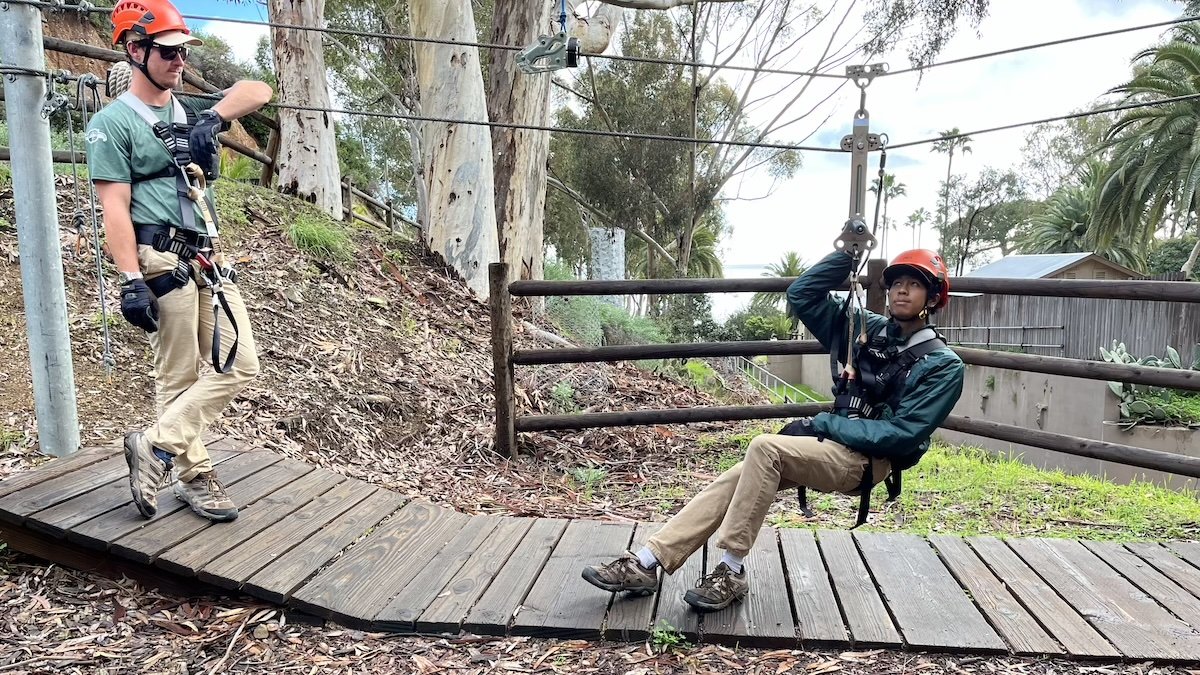
Wearing harnesses and helmets, we loaded back into the electric van for the 10-minute drive to the top of the mountain. At the top, the dreary weather seemed to match what we were feeling. The temperature had dropped and the wind picked up.
Ziplining Down a Mountain
In Arthur, Light and his team stumble upon an abandoned zip line early in their race. They see it as an opportunity to quickly descend an area with their mountain bikes. It’s one of the more exciting moments as one of the characters gets stuck on a worn-out part of the line and Light has to unbuckle himself, dangle above 100 feet off of the ground, and climb around her to help.
Most of the people on my team were just nervous about zip lining for the first time. As for me, I hid my nervousness by joking. I made comments like “At this height, the helmet wears you for protection” and “The fall won’t kill you, but it’ll probably break your leg.” However, I was also the first in line to go. I’d like to say I took cues from Lindnord who advocates leading by example, but I really just wanted to conquer my fear.
Despite my feelings, I trusted the gear and the safety check. I knew as soon as I went that I’d get over whatever anxiety I felt. Ahead of zipping, the zip line crew conducted a 10-point safety check, which involved tugging on all of the connection points including my helmet. I made one final joke – I asked “How far’s the drop?” to which Ricky said, “Don’t worry about it” — and jumped from the platform.
I liken riding a zip line for the first time to a toddler going down a slide at a playground for the first time. It’s scary yet exhilarating and then it just feels fun. As I zipped across the line at speeds as fast as 35 miles per hour, I got a panoramic view of the surrounding landscape and Pacific Ocean. Out of the five zip lines, the longest one was a little more than 1,000 feet long, so it lasted about 20 seconds.
The Alpine Scramble
Up next, the Bear Grylls instructors told us that we would be alpine scrambling and then had us count our steps so we’d know our 100-meter pace. As we walked and counted, we asked each other, “What’s alpine scrambling?” and nobody seemed to know.
A few hundred meters down we stopped at a spot with an assortment of gear spread out evenly. We once again put on a harness and helmet. Then, we each grabbed a short piece of rope, and instructor Sean, the rope man, took over the instruction. He showed us how to tie three types of knots: an alpine butterfly, a clove hitch, and a munter hitch.
To say Sean was simply a rope specialist might not do it justice. He had a certification in the skill. What’s more, he’s a professional and competitive arborist, so he’s always climbing trees and working with chainsaws, in addition to being a lead instructor for the Bear Grylls Survival Academy.
After what felt like an hour of tying knots, they gave both teams a 25-meter rope and had us decide which knot we should use to connect to it. We agreed with the alpine butterfly. Then, we discovered what the alpine scramble was.
While tied together, we went on what turned out to be a short but steep, muddy hike. The instructors mapped out a route that went up a grade that was more than a hill but not quite a wall with ground that was soft and muddy.
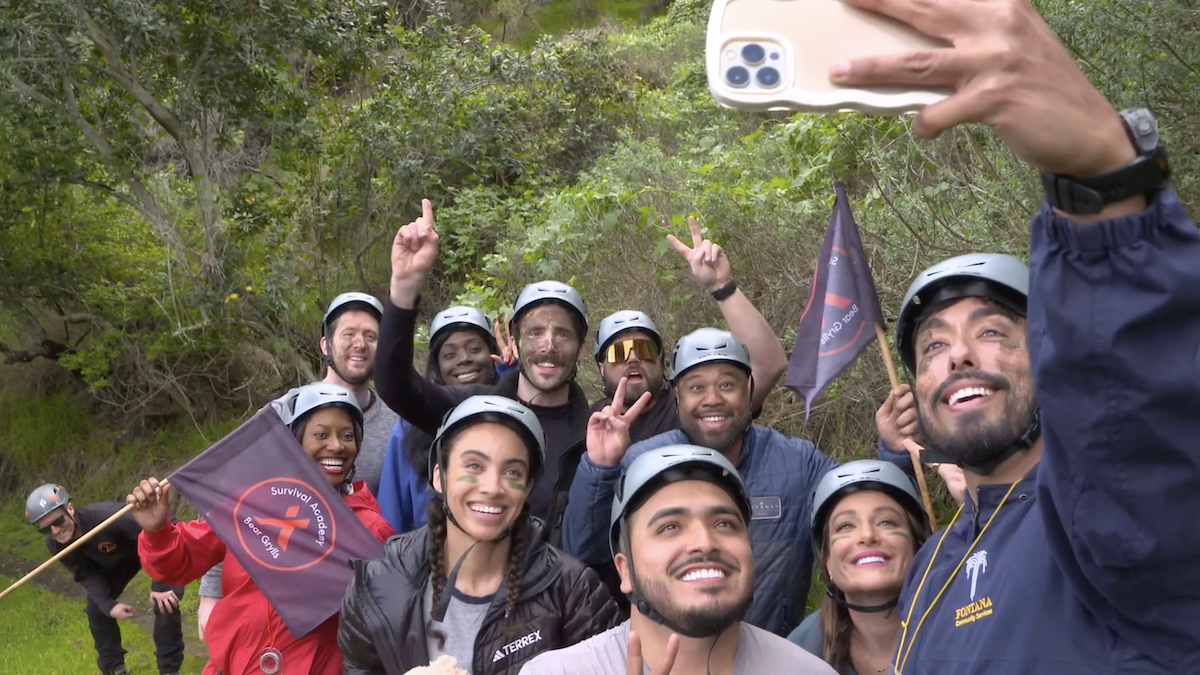
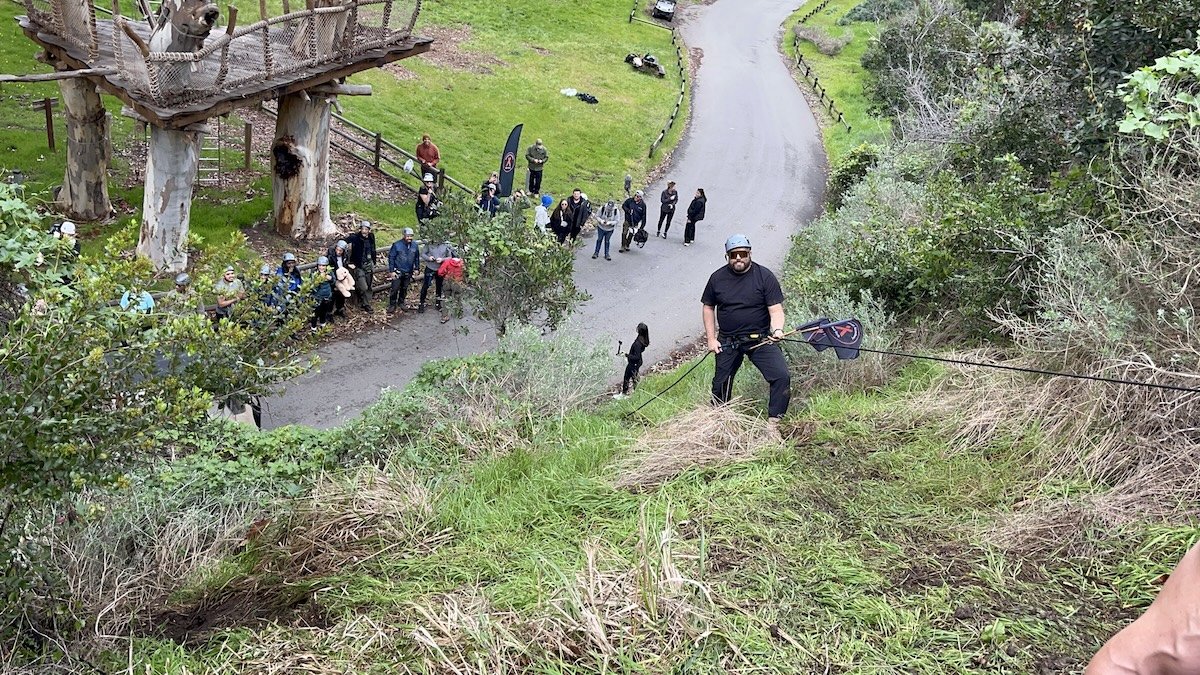
Speaking for myself, the most challenging part about it was walking with a group. As we each adhered to the advice of the instructors and secured sure footing along the path, we bunched up often. We didn’t move at a steady pace but rather walked and stopped, then walked and stopped, then . . .
When we got to the end, we rappelled down the hill. We walked over to what looked like a retired pool that was transformed into a drainage ditch. We were tasked with fashioning a rope and two wooden poles into a stretcher and then transporting a “wounded” team member through the ditch while taking selfies along the way. It sounds more complicated than it was.
Although they didn’t alpine scramble in the movie, there were a lot of small things that did connect. Arthur used his “sass” to stop others from walking off a cliff and a teammate was injured and had to be carried, but I think the biggest connection was inadvertent. What made the challenge so challenging was that it rained hard and the wind picked up considerably. It was the closest thing to suffering we would endure that day.
By the end, we were soaked, cold, and uncomfortable – just in time for the sunshine and lunch!
Bugs & Meatballs
Eating bugs and scavenged food is Bear Grylls’ thing. Just start typing “Bear Grylls eats” into a search engine and you’ll find a library of content. While I don’t think it’s as great a team-building exercise as alpine scrambling or zip lining, eating the grossest thing you can find in front of your peers is one of the biggest flexes you can do. Plus, it’s pretty fun to watch.
Standing in line next to Joey, we were paired up to eat dung beetles and mealworms together, which we did without hesitation. Now, they didn’t taste bad. They sort of reminded me of unflavored peanuts. The ick factor was the dry, crunchy texture and the fact that they were dung beetles and mealworms.
Still, neither Light nor Lindnord (who was participating in the day’s events) ate bugs during their adventure race. They did, however, eat meatballs. Wayfayrer Meatballs to be exact. After finishing a leg of the race, Light sits down to enjoy the balls of meat. Arthur, who was not yet named Arthur, watches him eat and patiently waits for scraps. Wanting to be kind to the dog, Light shares a couple and the rest is history.
Save Arthur!
Kayaking was the last event of the trip and a pivotal moment in Arthur the King. I won’t spoil the context, but in the movie, Light and his team are forced to leave Arthur behind ahead of kayaking. The dog follows, swimming as far as he can before struggling and then Light unsurprisingly saves him. So we ultimately had to try to save Arthur.
Kayaking was the event I was least enthusiastic about because I didn’t particularly want to get wet, and I thought the 55-degree weather might’ve been comfortable on land, but not so much in the water. Despite my feelings, I chose to instead fully embrace the opportunity and experience.
The kayak instructor went through the instructions. While it all seemed fairly straightforward, he stressed one piece of advice: “If you only remember one thing, make sure it’s BBF.” He explained that if you fall out of the kayak, the sequence you should follow to get back in is belly, butt, and then feet.
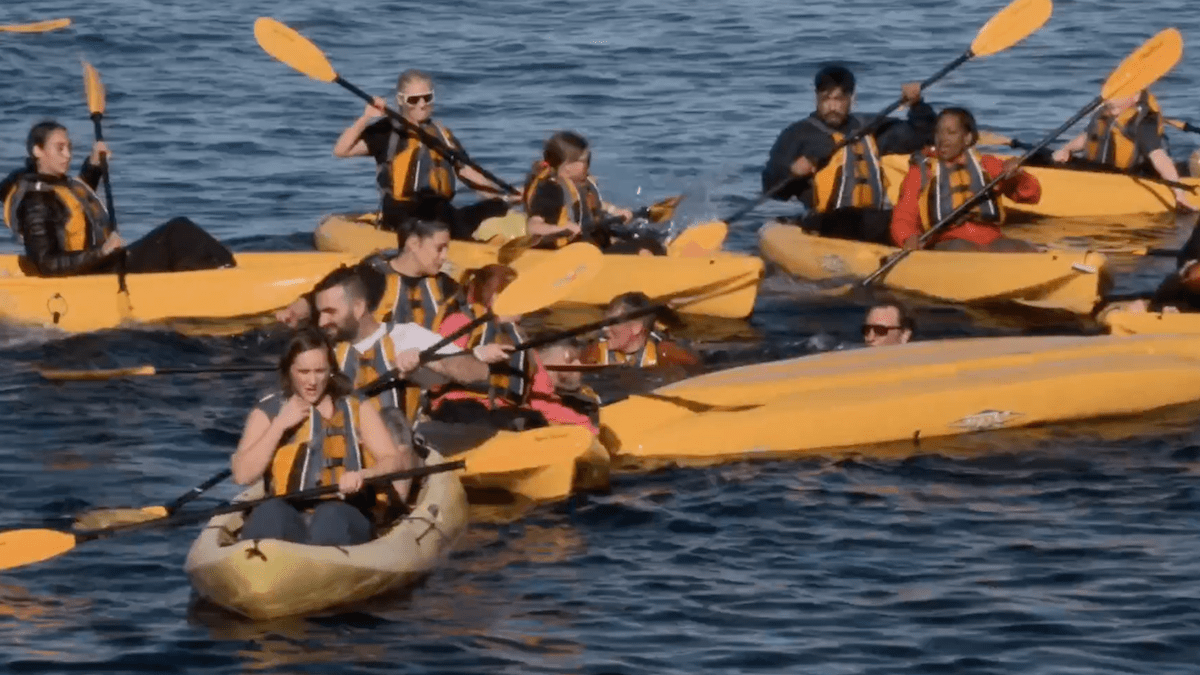
I paired up with Jeremy, who worked for Movie Guide, to share a kayak and it couldn’t have been a better match-up. We were nearly identical in height, weight, and build and we shared a passion for outdoor activities.
Out on the water, instructor Sean had us race out to one end of the shoreline. With our long arms, Jeremy and I were fast – probably the fastest out there (or the most competitive). We paddled hard. Each stroke reached deep into the water as we pulled ourselves across. We were the first to reach the end.
While we waited for the other kayaks to finish, I let my arms relax and I enjoyed the sunshine. Then, Sean pointed out to the other end and announced that our objective was at the other end where another instructor dressed in a dog costume was treading water. They implied that the team who saved him wins.
Despite our fatigue, Jeremy and I raced over. We again paddled hard and fast. We ended up slipping in just ahead of the lead boat to reach Arthur first. We were proud of ourselves for pushing through and embracing the “struggle.” Then, the instructor in the Arthur costume said: “Are you ready to be tipped over?” and proceeded to tip over our kayak.
Fortunately, the water was not as cold as I had anticipated. While our life jackets kept us afloat, we lightly treaded water and pushed the kayak upright. Jeremy swam over to the other side of the kayak for counterweight. And then we made good on the little bit of instruction we received. I pulled myself in, starting with my belly, rotated onto my butt, and then brought my feet inside. I leaned over to the opposite side of Jeremy so he could do the same.
Sure, it was a little deceiving to be duped into saving someone only to be intentionally pulled in. But for me, it was one of those moments where I was glad things worked out the way they did. Although things technically went bad because I fell (or tipped) out of the kayak, I would’ve been disappointed if it hadn’t happened.

I Survived Catalina Island
Besides teamwork and loyalty, one of the main themes in the movie is suffering. As endurance athletes, the characters make note of it repeatedly, whether they suffer through exhaustion, raw and bloody heels, or dehydration, but they say it with a smile, suggesting that suffering through a physical challenge leads to satisfaction. I couldn’t help but see the parallel between that and the exercises we had planned on Catalina Island.
When I reflect on my weekend adventure, many said they felt sore and tired after all of the activities. Everybody complained at one point or another about being cold and wet and how disgusting it was to eat bugs. But there was also excitement and cheering throughout the day. While I wouldn’t describe the experience as suffering, I would call it a suffering sampler and a taste of adventure.
Arthur the King will be in theaters beginning March 15, 2024.





